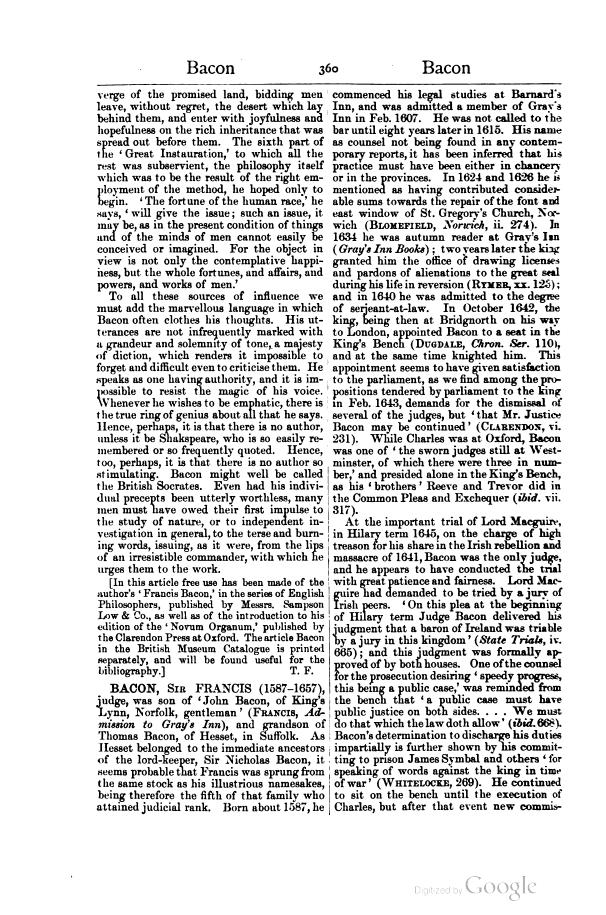verge of the promised land, bidding men leave, without regret, the desert which lay behind them, and enter with joyfulness and hopefulness on the rich inheritance that was spread out before them. The sixth part of the 'Great Instauration,' to which all the rest was subservient, the philosophy itself which was to be the result of the right employment of the method, he hoped only to begin. 'The fortune of the human race,' he says, 'will give the issue; such an issue, it may be, as in the present condition of things and of the minds of men cannot easily be conceived or imagined. For the object in view is not only the contemplative happiness, but the whole fortunes, and affairs, and powers, and works of men.'
To all these sources of influence we must add the marvellous language in which Bacon often clothes his thoughts. His utterances are not infrequently marked with a grandeur and solemnity of tone, a majesty of diction, which renders it impossible to forget and difficult even to criticise them. He speaks as one having authority, and it is impossible to resist the magic of his voice. Whenever he wishes to be emphatic, there is the true ring of genius about all that he says. Hence, perhaps, it is that there is no author, unless it be Shakspeare, who is so easily remembered or so frequently quoted. Hence, too, perhaps, it is that there is no author so stimulating. Bacon might well be called the British Socrates. Even had his individual precepts been utterly worthless, many men must have owed their first impulse to the study of nature, or to independent investigation in general, to the terse and burning words, issuing, as it were, from the lips of an irresistible commander, with which he urges them to the work.
[In this article free use has been made of the author's 'Francis Bacon,' in the series of English Philosophers, published by Messrs. Sampson Low & Co., as well as of the introduction to his edition of the 'Novum Organum,' published by the Clarendon Press at Oxford. The article Bacon in the British Museum Catalogue is printed separately, and will be found useful for the bibliography.]
BACON, Sir FRANCIS (1587–1657), judge, was son of 'John Bacon, of King's Lynn, Norfolk, gentleman' (Francis, Admission to Gray's Inn), and grandson of Thomas Bacon, of Hesset, in Suffolk, As Hesset belonged to the immediate ancestors of the lord-keeper. Sir Nicholas Bacon, it seems probable that Francis was sprung from the same stock as his illustrious namesakes, being therefore the fifth of that family who attained judicial rank. Born about 1587, he commenced his legal studies at Barnard's Inn, and was admitted a member of Gray's Inn in Feb. 1607. He was not called to the bar until eight years later in 1615. His name as counsel not being found in any contemporary reports, it has been inferred that his practice must have been either in chancery or in the provinces. In 1624 and 1626 he is mentioned as having contributed considerable sums towards the repair of the font and east window of St. Gregory's Church, Norwich (Blomefield, Norwich, ii. 274). In 1634 he was autumn reader at Gray's Inn (Gray's Inn Books); two years later the king granted him the office of drawing licenses and pardons of alienations to the great seal during his life in reversion (Rymer, xx. 123); and in 1640 he was admitted to the degree of serjeant-at-law. In October 1642, the king, being then at Bridgnorth on his way to London, appointed Bacon to a seat in the King's Bench (Dugdale, Chron. Ser. 110), and at the same time knighted him. This appointment seems to have given satisfaction to the parliament, as we find among the pro- positions tendered by parliament to the king in Feb. 1643, demands for the dismissal of several of the judges, but 'that Mr. Justice Bacon may be continued ' (Clarendon, vi. 231). While Charles was at Oxford, Bacon was one of 'the sworn judges still at Westminster, of which there were three in number,' and presided alone in the King's Bench, as his 'brothers' Reeve and Trevor did in the Common Pleas and Exchequer (ibid. vii. 317).
At the important trial of Lord Macguire, in Hilary term 1645, on the charge of high treason for his share in the Irish rebellion and massacre of 1641, Bacon was the only judge, and he appears to have conducted the trial with great patience and fairness. Lord Macguire had demanded to be tried by a jury of Irish peers, 'On this plea at the beginning of Hilary term Judge Bacon delivered his judgment that a baron of Ireland was triable by a jury in this kingdom' (State Trials, iv. 665); and this judgment was formally approved of by both houses. One of the counsel for the prosecution desiring 'speedy progress, this being a public case,' was reminded from the bench that ' a public case must have public justice on both sides. … We must do that which the law doth allow' (ibid, 668). Bacon's determination to discharge his duties impartially is further shown by his committing to prison James Symbal and others 'for speaking of words against the king in time of war' (Whitelocke, 269). He continued to sit on the bench until the execution of Charles, but after that event new commis-
